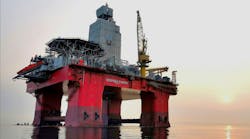RIO DE JANEIRO�A key emerging issue for petroleum companies in Latin America is the same concern over cleaner transportation fuel specifications that have moved to the forefront of refiners� concerns in Europe and the US.
That view was expressed on Wednesday by Jose Felix Garcia, the new executive secretary of the regional association of oil and natural gas companies in Latin America and the Caribbean (ARPEL), at the Rio Oil & Gas Conference in Rio de Janeiro. The association was created in 1965 and has 27 members representing 90% of the region�s upstream and downstream operations.
An ARPEL meeting devoted to studying Latin American fuel spec challenges and organized by Repsol-YPF SA is scheduled to take place Nov. 30-Dec. 1 in San Jose, Costa Rica.
According to Garcia, the southern nations of the Western Hemisphere have an opportunity to develop a more efficient cost-benefit ratio for new transportation fuel specifications than do their neighbors to the North, where the number of vehicles per inhabitant is fivefold greater. �Currently, several R&D centers here are committed to exploring the viability of a new catalyst less sensitive to sulfur. The sulfur content of fuels is currently being reduced in refineries [elsewhere in the world] at high costs.�
Latin America�s rapidly growing and evolving oil and gas sector presents an ideal opportunity to study the question, Garcia said: �Due to deregulation, this is the right time and the best opportunity to promote and facilitate development, integration, and optimization of [Latin America�s] oil and gas potential.
At the same time, Garcia said, continuing efforts to deregulate the region�s energy sector and the continuing surge of foreign company investment in Latin American oil and gas projects is helping to solve one of the regional industry�s most pressing problems�that of cash flow. While there is no shortage of the technology needed or of E&P opportunities, capital availability continues to be in short supply.
Other projects
Another ongoing ARPEL project is the status of regional energy integration:
�We have an energy legislation and deregulation advisory committee following the work of regulatory organizations and setting up guidelines to harmonize legal frameworks to foster energy integration,� Garcia added. The project for integration of natural gas markets in South America also involves the United Nations and OLADE (Latin America�s association of state energy companies).
The next workshop on the energy integration initiative is scheduled for Nov. 23-24 in Santa Cruz de la Sierra, Bolivia. The Institut Francaise du Petrole is the committee consultant.
Meanwhile, ARPEL, OLADE, and representatives of indigenous groups are currently discussing a regulatory draft to be submitted to all Amazon countries where oil and gas exploration is under way.
ARPEL was recently awarded $3 million for its energy projects by the Canadian International Development Agency. ARPEL also has the support of a network of government institutions and industry associations, including OLADE, the International Energy Agency, the World Bank, American Petroleum Institute, Europia, Latin American and Caribbean Economic Commission, and the Inter-American Development Bank, among others.
